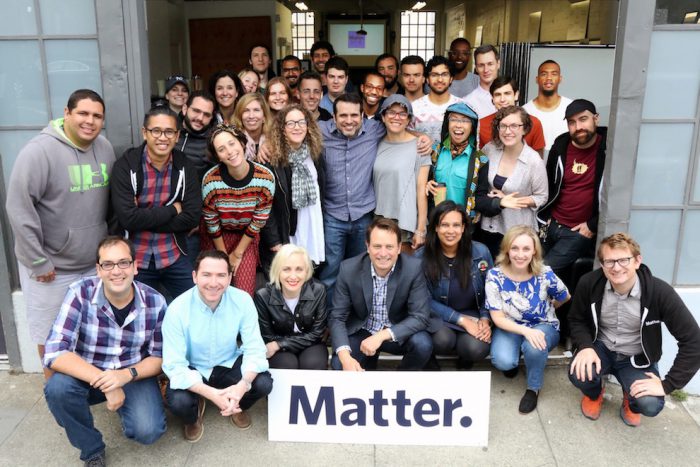
When Matter cofounder and managing director Corey Ford finished the inaugural two-city version of the media startup accelerator, he was nearly dead.
As half of Matter’s original two-person team, he had spent 122 days working with half of the class in New York City, while his home (and two kids) were in Oakland, along with the other half of the entrepreneurs.
“We came to the realization that if we really wanted to expand our impact, we needed to make sure that Matter wasn’t just The Corey Show,” Ford said.
After a round of hiring earlier this year, Matter is at its largest staff size ever, with nine people, and launches its seventh class today with an intensive boot camp, retreat, and design review for 12 early-stage startups. (Matter gets support from partners including The New York Times, the Associated Press, and Google News Lab.)
“We restructured our team so that we have a director of programs and a director of investments in each city,” Ford said. “Last year was the first prototype of Matter in New York City, but now we’re equally robust in both locations, and I’m not dead.”
One of those hires is Ben Werdmuller, the director of investments based in San Francisco. Werdmuller participated in the third cohort of Matter back in 2014 and says working on the leadership team to provide the experiences that he had for other entrepreneurs is a “dream job.”
“It’s about cross-pollination,” he said. “We are building a community as much as we are supporting companies.”
Matter decided to focus on five areas in selecting the members of its current class: diversity and inclusion, security, emerging technology, trust in media, and going beyond advertising. The members of the class this year:
— CivNet, an Albuquerque-based social network optimized for real-world action and citizen activism (based in San Francisco);
— DADA, a social network embracing the artistic process as its primary form of communication (based in NYC);
— The Establishment, a platform developed by three women who spent careers in male-dominated newsrooms with the goal of creating space for diversity in media (based in San Francisco);
— Grafiti, a data storytelling tool conceptualized by a journalist reporting on the ground of the Arab Spring that helps people share verified information with each other as easily as sharing other information on social media (based in NYC);
— In the Room, a social networking backchannel for any location, like conferences or protests, that brings together users based on interests and skills rather than first impressions and unconscious bias (based in San Francisco);
— Multimer, creating empathy maps of cities using wearables tested by bicyclists across the streets of Manhattan to help businesses make smarter decisions about store locations and urban planners devise a better environment (based in NYC);
— Nametag, a one-person operation started during the initial phases of the war in Iraq to help movements make a bigger impact through more secure channels (based in San Francisco);
— Purple, which serves to connect users and journalists in a two-way messaging-based conversation, based off of one of the cofounders’ experiences explaining politics to her friends in college (based in NYC);— Rewire, originally built as activist-friendly security technology for communications during the Occupy movement but now evolving (journalist Laura Poitras used it to communicate with Edward Snowden) and soon coming to market as a secure messaging service for anyone (based in NYC);
— Signl.fm, a platform that can open up podcasts to search engines and other applications for greater sharing and discovery in audio storytelling (based in San Francisco);
— SmartFeed, connecting parents to positive storytelling options for their kids in order to promote more wholesome values through quality media diets (based in San Francisco);
— Vigilant, a treasure trove of searchable public data through a single user interface that tracks open datasets (based in NYC).
One of the many criticisms levied at the media in the past year is that it ignores people between the coasts. Matter has expanded from the West Coast to East Coast, but how is it including middle America in the conversation?
“That’s something we’ve actually been thinking a lot about. We’re taking it one step at a time,” Ford said. “We have problems in the media that are coastal and Matter is coastal as well.
“We have partners like McClatchy who actually are very deep in middle America,” he added. “Could there be a Matter Kansas City in the future? It’s possible. It’s not for sure yet, but we’re definitely thinking about that side of the equation.”